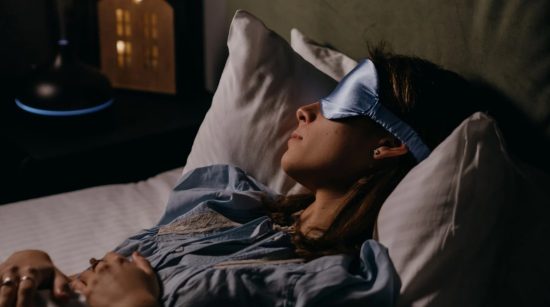Tired of the nightly symphony that your partner’s snoring creates? Or perhaps you’re the one sawing logs, much to the chagrin of everyone within earshot. Snoring is more than just a noisy nuisance; it can wreak havoc on your quality of sleep and leave you feeling exhausted day after day. But fear not because we’ve got some effective solutions to help you put an end to snoring once and for all!
In this blog post, we’ll explore what causes snoring, how it affects your sleep, and, most importantly, how to stop snoring for good. Get ready for quieter nights and better rest ahead!
What is Snoring?

Snoring is a common condition that occurs when the flow of air through the mouth and nose is partially obstructed during sleep. This obstruction causes vibrations in the tissues of the throat, leading to the sound we commonly associate with snoring. While occasional snoring may not be a cause for concern, persistent loud snoring can disrupt sleep patterns and potentially indicate an underlying health issue.
What Causes Snoring?
Snoring, a common issue worldwide, is often caused by relaxed throat and tongue muscles during sleep, leading to airway blockage and vibrations.
Lifestyle factors such as excessive alcohol, smoking, and obesity contribute, as does nasal congestion, forcing mouth breathing. Sleeping on your back increases gravity’s effect on throat tissues, causing snoring.
Structural issues like enlarged tonsils may also play a role. Identifying these factors is crucial for effective remedies, including lifestyle changes and medical interventions, to enhance sleep quality and overall well-being.
How Does Snoring Affect Sleep Quality?

Snoring can significantly impact sleep quality, both for the person snoring and their sleep partner. The disruptive noise from snoring can lead to frequent awakenings throughout the night, preventing the snorer from entering into deep, restorative sleep stages. As a result, snorers may experience:
- Daytime Sleepiness and Fatigue: Interrupted sleep caused by snoring can lead to excessive daytime sleepiness, which can affect concentration, productivity, and overall quality of life.
- Fragmented Sleep Patterns: Snorers often experience fragmented sleep, characterized by frequent awakenings. This can prevent the individual from obtaining the recommended amount of uninterrupted sleep necessary for optimal functioning.
- Poor Sleep Quality: Snoring can reduce the overall quality of sleep, leaving individuals feeling unrefreshed and groggy upon waking.
- Mood Disturbances: Sleep deprivation resulting from snoring can contribute to irritability, mood swings, and a higher risk of developing mood disorders such as depression and anxiety.
- Strain on Relationships: Snoring can cause significant disruption for sleep partners, leading to frustration, resentment, and even separate sleeping arrangements in severe cases.
- Increased Risk of Health Conditions: Chronic, loud snoring may be indicative of underlying health conditions, such as obstructive sleep apnea. Sleep apnea has been linked to various health issues, including hypertension (high blood pressure), cardiovascular problems, and an increased risk of stroke.
When snoring affects sleep quality and becomes a persistent issue, seeking medical advice is advisable. Healthcare professionals can help diagnose any underlying conditions, provide appropriate treatment options, and suggest lifestyle modifications to alleviate snoring and improve sleep quality.
How to Stop Snoring?
Maintain a Healthy Weight

Maintaining a healthy weight is essential for overall well-being and can contribute to reducing snoring. A healthy weight helps to minimize excess fatty tissue around the neck and throat, which can obstruct airflow and lead to snoring.
To achieve and maintain a healthy weight, it is crucial to focus on a balanced diet consisting of nutrient-dense foods, practise portion control, and avoid excessive consumption of sugary and high-fat foods. Regular physical activity is also essential, as it helps burn calories, increase metabolism, and improve overall fitness.
Additionally, staying hydrated, getting sufficient sleep, and seeking support from healthcare professionals can all contribute to successful weight management. By maintaining a healthy weight, individuals can not only reduce the likelihood of snoring but also enhance their overall health and well-being.
Sleep on Your Side

The lateral sleeping position, or sleeping on your side, aligns the airway and minimizes obstruction risks. Sleeping on your side helps to keep the airway open and prevents the tongue and soft palate from collapsing against the back of the throat, which can contribute to snoring.
To encourage side sleeping, use pillows or positional devices to provide support and maintain the appropriate sleep posture. Some people find it helpful to place a body pillow behind their back to prevent rolling onto their back during the night. Additionally, using a contour pillow or placing a pillow between the knees can enhance comfort and promote side sleeping.
Developing the habit of sleeping on your side can be a simple yet effective way to alleviate snoring and improve the quality of sleep for both yourself and your sleep partner.
Elevate Your Head

Elevating your head while sleeping can be an effective strategy to reduce snoring. By raising the head, you can help keep the airway open and improve airflow, making it easier to breathe during sleep.
There are a few ways to elevate your head: you can use an extra pillow or increase the height of your bed by a few inches. This elevation helps to prevent the tongue and soft tissues in the throat from collapsing against the back of the throat, which can contribute to snoring. It can also help alleviate nasal congestion and promote better breathing through the nose.
Experimenting with different heights and pillow arrangements can help you find the most comfortable and effective position for reducing snoring and improving sleep quality.
Avoid Alcohol and Sedatives

Avoiding alcohol and sedatives before bed is a key step in reducing snoring. Alcohol and certain sedatives can relax the muscles in the throat, including the tongue and soft palate. This relaxation increases the likelihood of these tissues collapsing and obstructing the airway, leading to snoring.
By abstaining from alcohol and sedatives, especially in the hours leading up to bedtime, you can help keep the throat muscles more toned and reduce the risk of snoring during sleep.
Opting for non-alcoholic beverages and exploring relaxation techniques that do not involve sedatives can be beneficial in promoting better sleep quality and minimizing snoring episodes.
Clear Nasal Passages

Clearing nasal passages is an effective approach to reducing snoring caused by nasal congestion. When the nasal passages are congested, airflow becomes restricted, and breathing through the nose becomes more difficult, increasing the likelihood of snoring.
To clear nasal passages, you can use nasal strips, saline nasal sprays, or a neti pot. Nasal strips help open up the nasal passages, promoting better airflow. Saline nasal sprays provide moisture and help flush out irritants, allergens, and mucus, relieving congestion. Neti pots use a saline solution to rinse the nasal passages, reducing inflammation and congestion.
These methods can help alleviate nasal blockages, allowing for unobstructed breathing through the nose and reducing the chances of snoring. However, if chronic congestion persists, it is advisable to consult with a healthcare professional for further evaluation and appropriate treatment options.
Treat Allergies and Sinus Issues

Treating allergies and sinus issues can play a significant role in reducing snoring. Allergies and sinus conditions, such as allergic rhinitis or sinusitis, can cause nasal congestion and inflammation, leading to obstructed airflow through the nose and increased snoring. Identifying and managing underlying allergies, whether through antihistamines, nasal sprays, or allergy shots, can help alleviate symptoms and improve nasal breathing.
Similarly, treating sinus infections or chronic sinusitis with appropriate medications, such as antibiotics or corticosteroids, can reduce inflammation and congestion, ultimately aiding in better airflow and reducing the likelihood of snoring.
It is crucial to consult with a healthcare professional for an accurate diagnosis and tailored treatment plan based on the specific allergies or sinus issues you may be experiencing.
Quit Smoking

Quitting smoking is not only beneficial for overall health but can also help reduce snoring. Smoking irritates the throat and airways, causing inflammation and swelling of the tissues. This inflammation can lead to narrowing of the airway, contributing to snoring.
By quitting smoking, individuals can reduce throat irritation, decrease inflammation, and improve the overall health of their respiratory system. Breaking the habit of smoking may be challenging, but it can have a positive impact on reducing snoring episodes, improving sleep quality, and preventing other serious health conditions.
Seeking support from healthcare professionals, joining support groups, or trying nicotine replacement therapy can increase the chances of successfully quitting smoking and enjoying a snore-free, healthier future.
Use Anti-Snoring Devices

Anti-snoring devices can be a useful tool for individuals struggling with snoring issues. These devices are designed to improve airflow, keep the airway open, and reduce the vibrations that cause snoring. Nasal dilators are small, flexible devices that are inserted into the nostrils to open up the nasal passages and promote better breathing.
Oral appliances are custom-fitted devices that reposition the jaw to help keep the airway clear during sleep. Chin straps, which are worn around the head to keep the mouth closed and encourage breathing through the nose, are another option. While the effectiveness of these devices may vary from person to person, many individuals find relief and experience reduced snoring with the use of these anti-snoring devices.
It’s important to consult with a healthcare professional or a sleep specialist to determine the most suitable device for your specific needs.
Treat Underlying Sleep Apnea

Effective treatment for underlying sleep apnea is crucial in managing snoring and improving overall sleep quality. Sleep apnea is a serious condition where breathing repeatedly stops and starts during sleep, leading to fragmented sleep and potential health risks.
Continuous positive airway pressure (CPAP) therapy is a common treatment option for sleep apnea, involving the use of a machine that delivers a constant flow of pressurized air through a mask to keep the airway open. Another alternative is the use of oral appliances, which help reposition the jaw and tongue to maintain an open airway. In some cases, surgery may be recommended to correct any anatomical abnormalities causing sleep apnea.
It is important to consult with a healthcare professional or a sleep specialist who can diagnose and guide you towards the most suitable treatment approach based on your individual circumstances. Regular follow-up visits and adherence to the prescribed treatment plan are essential for effectively managing sleep apnea and reducing snoring.
| Solutions | Definition |
| Maintain Healthy Weight |
Focus on balanced diet, exercise, and hydration to reduce excess neck tissue and improve breathing.
|
| Sleep on Your Side |
Encourage side sleeping with pillows or body support to keep airways clear and minimize tissue collapse.
|
| Elevate Head |
Use extra pillows or adjust bed height to prevent throat tissue collapse and improve nasal breathing.
|
| Avoid Alcohol & Sedatives |
Stay away from substances that relax throat muscles, contributing to snoring.
|
| Clear Nasal Passages |
Use nasal strips, saline sprays, or neti pots to relieve nasal congestion and improve airflow.
|
| Treat Allergies & Sinus Issues |
Manage allergies and sinus problems to reduce congestion and inflammation, promoting clear nasal breathing.
|
| Quit Smoking |
Quitting smoking reduces throat irritation and inflammation, improving airway health and reducing snoring.
|
| Anti-Snoring Devices |
Consider using devices like nasal dilators, oral appliances, or chin straps to improve airflow and reduce vibrations causing snoring.
|
| Treat Sleep Apnea |
Address underlying sleep apnea with CPAP therapy, oral appliances, or surgery as recommended by healthcare professionals.
|
Diagnosis and Treatment of Obstructive Sleep Apnoea
Obstructive Sleep Apnoea (OSA) is a common sleep disorder characterized by pauses in breathing or shallow breathing during sleep due to obstructed airways. Diagnosis of OSA often involves sleep studies and polysomnography, which monitor various physiological parameters during sleep, such as breathing patterns, oxygen levels, heart rate, and brain activity. These tests help confirm the presence and severity of OSA, guiding healthcare providers in developing an appropriate treatment plan.
Treating OSA and associated symptoms like snoring often begins with lifestyle changes, such as weight loss, regular exercise, and avoiding alcohol and sedatives before bedtime. Continuous Positive Airway Pressure (CPAP) therapy is a common treatment for OSA, where a device delivers pressurized air through a mask to keep the airways open during sleep. Other treatments include oral appliances to reposition the jaw, surgery to remove obstructions, and positional therapy to encourage sleeping on one’s side. Effective management of OSA not only improves sleep quality but also reduces the risk of associated health complications like cardiovascular disease and daytime fatigue.
Conclusion
Snoring, a common issue affecting sleep quality for both individuals and their partners, can lead to daytime fatigue and health concerns. Effective solutions range from lifestyle changes like maintaining a healthy weight to medical treatments such as oral appliances.
Natural remedies like nasal strips or adjusting sleeping positions may also help. It’s crucial to recognize the individuality of snoring solutions, requiring trial and error and consulting with a healthcare professional aids in identifying the root cause and developing a tailored treatment plan.
By addressing these factors, you can significantly reduce or eliminate snoring, improving not only your sleep but also that of those around you. Take action today for peaceful, uninterrupted nights!
FAQs – How to Stop Snoring?
Can snoring be cured?
While there’s no single “cure” for snoring, many effective solutions can significantly reduce or eliminate it. Lifestyle changes, positional therapy, oral appliances, and medical devices can all be very successful. In rare cases, surgery might be an option.
Is it bad if you snore?
Occasional snoring might not be harmful. However, chronic snoring can disrupt sleep for both the snorer and their partner, leading to daytime fatigue, mood swings, and even health problems like high blood pressure. Additionally, it could be a sign of an underlying condition like sleep apnea, which requires medical attention.
Do healthy people snore?
Anyone can snore, regardless of overall health. However, certain factors like weight, allergies, alcohol consumption, and sleep position can increase the likelihood of snoring, even in healthy individuals.
When should I go to the doctor for snoring?
Consult a doctor if:
- Your snoring is loud and frequent, disrupting your or your partner’s sleep.
- You experience daytime sleepiness, fatigue, or difficulty concentrating.
- You have witnessed pauses in your breathing during sleep (a potential sign of sleep apnea).
- You have other health conditions like high blood pressure or heart disease.
What happens if snoring is left untreated?
Untreated snoring can lead to various consequences:
- Sleep deprivation: This can impact mood, focus, memory, and overall health.
- Relationship problems: Snoring can strain relationships with partners due to disrupted sleep and frustration.
- Increased health risks: Chronic sleep deprivation is linked to various health problems like high blood pressure, heart disease, stroke, and diabetes.
- Untreated sleep apnea: If sleep apnea is the underlying cause, leaving it untreated can lead to serious health complications.

